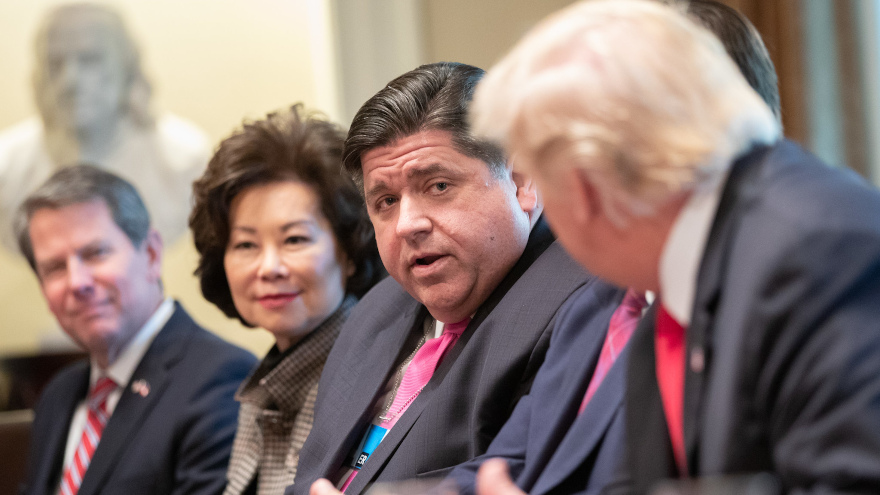3 associations urge Illinois governor to nix rate-cap measure

Illinois Gov. J.B. Pritzker is pictured here during a meeting at the White House on Dec. 13, 2018. Official White House Photo by Shealah Craighead.
By subscribing, you agree to receive communications from Auto Remarketing and our partners in accordance with our Privacy Policy. We may share your information with select partners and sponsors who may contact you about their products and services. You may unsubscribe at any time.
WASHINGTON, D.C. –
The American Financial Services Association, in collaboration with the Illinois Financial Services Association, the Independent Finance Association of Illinois and the Illinois Automobile Dealers Association, sent a letter on Friday to Gov. J.B. Pritzker to state their “grave concerns” about a measure about to become law in Illinois that would create a rate cap on loans, including auto financing.
The associations asked Pritzker to veto Senate Bill 1792, which would create the Predatory Loan Prevention Act and institute a 36% rate cap based on the federal military annual percentage rate for all loans not exceeding $40,000.
“While SB 1792 contains many admirable provisions aimed at creating a more equitable Illinois, the proposed rate cap would leave Illinois consumers worse off and immediately cut off access to credit for those most in need,” the associations wrote in their letter.
The associations explained their position by noting the confusion potentially triggered by how this act is crafted.
The letter stated that for more than 50 years, the federal Truth in Lending Act (TILA) has provided a standard of how to calculate the annual percentage rate (APR) of loans, ensuring that all references to APR are consistent and require little interpretation.
“This allowed consumers to have a clear understanding of the terms and cost of credit and to compare costs of similar loan products,” the associations said. “TILA expressly excluded the costs of voluntary products from the APR calculation.”
Subscribe to Auto Remarketing to stay informed and stay ahead.
By subscribing, you agree to receive communications from Auto Remarketing and our partners in accordance with our Privacy Policy. We may share your information with select partners and sponsors who may contact you about their products and services. You may unsubscribe at any time.
The letter goes on to note that the federal Military Lending Act introduced a military APR (MAPR) that, unlike TILA, includes the cost of voluntary goods, services, or insurance that are unrelated to the cost of credit and “are not comparable across credit products.”
The associations pointed out that, “Whereas traditional TILA APR applies to all consumers and all credit products, MAPR is only applicable for certain small loans to active-duty servicemembers and their dependents.
“Importantly, this distinction exists, in part, because certain types of insurance and protection products are already available to members of the military as a benefit of their service. For this reason alone, MAPR is not appropriate for broader application beyond servicemembers,” they added.
The letter goes on to specify a host of metrics finance companies consider when deciding whether to extend credit such as average charge-offs, cost of service and cost of capital — all data points that can vary depending on the consumer’s credit standing.
The associations then offered a rudimentary example to give the top Illinois lawmaker another point to consider. It went as follows:
For example, say you lend me $100 today and charge me $1 in interest:
— If I pay you back in one year, the APR is 1%
— If I pay you back in one month, the APR is 12%
— If I pay you back tomorrow, the APR is 365%
— If I pay you back in an hour, the APR is 8760%
Same dollar in interest, vastly different APRs.
Should the act become law, the associations cautioned Pritzker about other potential ramifications.
“While elite borrowers in Illinois may be able to find other sources of credit or afford larger loan sizes, lower-income individuals will likely be left in credit deserts and forced to turn to more dangerous, or illegal, options like pawnbrokers and loan sharks,” they wrote.
“Because our members report to credit bureaus, they help hundreds of thousands of Illinois adults graduate out of subprime credit scores each year—so we deeply understand the effects of this bill,” they continued. “This will have a ripple effect in those communities where unregulated lenders will operate and proliferate, credit mobility will decline, debt costs will increase as will overall debt loads, and long term wealth will decline when people lose access to both affordable credit and means to improve their credit scores.”
Signing the letter were AFSA senior vice president Danielle Fagre Arlowe and Mark Dapier of the Independent Finance Association of Illinois as well as Illinois Financial Services Association executive director and general counsel Brett Ashton and IADA president Pete Sander.
The entire six-page letter can be found here.


